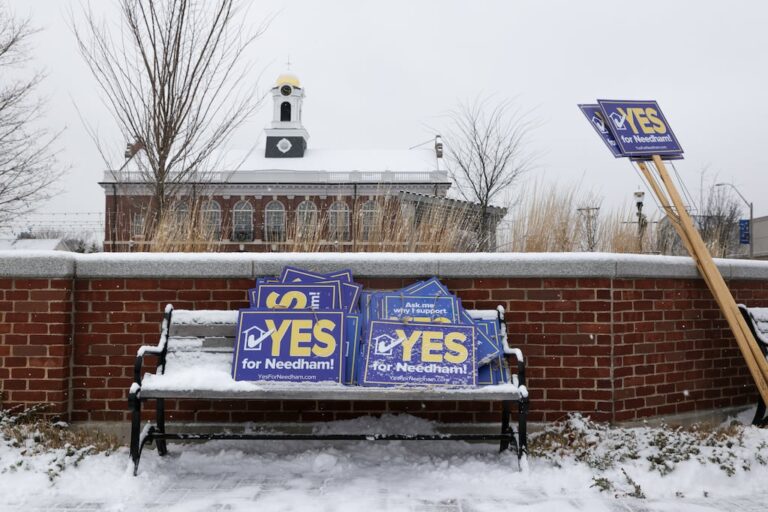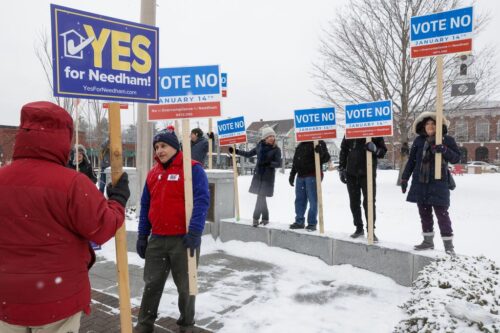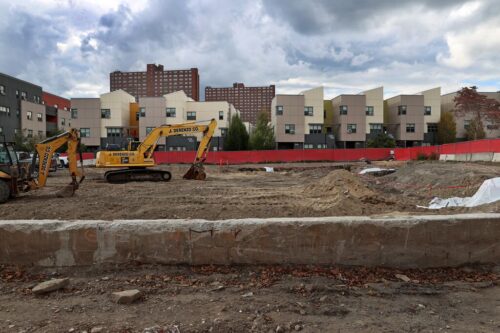Governor Maura Healey’s administration is tightening the screws to enforce a much-debated law that would make it easier to build housing in cities and towns served by the T, threatening to withhold millions of dollars in state grants from communities that do not comply.
And now a new penalty for noncompliance with the MBTA Communities Act has struck a nerve: If a city or town does not meet the law’s requirements to zone for denser multifamily housing, its fire department could lose access to funds for firefighter safety equipment.
Fire departments learned the news earlier this month when the state circulated an updated set of guidelines for the Firefighter Safety Equipment Grant Program that included MBTA Communities compliance as a stipulation. Now several have authored letters to the state protesting the change.
The application period for the grant program closed in October 2024. When the list of communities that were awarded funds under the program came out recently, most that had not met a 2024 deadline to approve their MBTA Communities plans were excluded, though after fire departments protested the move, those towns received grant funding award letters. The Healey administration has said that no community has been denied a fire safety grant for noncompliance.
Antonio Marino, the fire chief in Wrentham, said he only learned about the new stipulation to the grant program after other fire chiefs raised the alarm.
“I’m pissed,” he said.
In latest pushback to key state housing law, Needham voters say no to town’s plan
Each year, Marino said, his department gets between $5,000 and $7,500 from the town for equipment costs. But some of his equipment is between 20 and 30 years old, and he needs new gear for wildfires and other hazardous situations. Under the state program, his department is eligible for up to $19,000, which he said could cover the cost of new coats and pants.
In previous years, he’s used the money to buy new ballistic vests and helmets, and components for the department’s jaws of life tool.
“This is about firefighter safety,” Marino said. ”We’re not a pawn in this game. We break our ass fighting fires on state land, and we need this equipment to keep my guys safe. It’s very discouraging and very frustrating that this administration is naive enough to think we would take this as anything other than an attack on these communities and an attack on public safety.”
Wrentham’s open Town Meeting last year voted against a plan that would have aligned the town with the requirements of MBTA Communities. Some leaders there had previously said they had no interest in allowing more multifamily housing.
Since the law took effect in 2021, state officials have made clear that towns that did not meet compliance deadlines would be denied various state grants, for needs ranging from infrastructure to planning. Some towns have millions of dollars at stake. For a brief period two years ago, the state planned to withhold some funding from local housing authorities from towns that failed to meet initial requirements. But the fire grants are a new twist.
The Healey administration said Friday that since communities have more time to comply with the law under new emergency regulations filed earlier this month, “no community is being denied a fire safety grant for not being in compliance at this time.”
“The Healey-Driscoll Administration is committed to supporting local fire departments and working with communities to come into compliance with the MBTA Communities Law, which is an essential component of our efforts to make housing more affordable,” Karissa Hand, a spokesperson for the administration, said in a statement.
The move by the Healey administration is the state’s latest attempt to compel defiant cities and towns to comply with MBTA Communities, a policy that is central to the administration’s push to build more housing and tackle the soaring cost of living in Massachusetts. It has not proven easy, and 31 communities were briefly considered out of compliance after missing a year-end deadline to approve plans, before the administration extended that deadline to July.
Up to this point, some defiant communities have viewed the loss of grant money as relatively inconsequential. But this latest move has sparked backlash.
Map: Nearly 200 towns must rezone under the MBTA Communities law. Has your town complied?
The state Senate Republican Caucus recently sent a letter to the Healey administration saying that, under the new MBTA Communities deadlines, which were filed after the Supreme Judicial Court ruled the administration must launch a formal regulatory process for the law’s guidelines, fire departments in noncompliant communities should still be eligible for the grants.
Those communities now have until July to pass a plan to comply with the law under the new regulations, the letter said, and until then, cities and towns should not lose access to any grant programs.
“These denials are contrary to the emergency regulations and are only harming municipalities who are working to maintain the safety of their community,” the senators wrote.
Duxbury Fire Chief Robert Reardon said his department had received funds from the program three or four years running. The news that Duxbury may no longer be eligible if it doesn’t comply with MBTA Communities was “disappointing,” he said. Duxbury has a tight budget, he said, which means the department often relies on state grants for things like equipment purchases. Town Meeting there overwhelmingly rejected a plan to comply with the law late last year.
“The people of our town made a decision to go against MBTA Communities Act,“ said Reardon, who said that he was not criticizing the Healey administration politically. ”I understand where they were coming from, but it doesn’t seem right to me to let politics impact the work we do, which is to protect our community.”
SJC supports controversial housing law, but says details must be rewrittenDespite high-profile losses, most towns passed their MBTA Communities plans this springAn ambitious Mass. housing law is coming to your town. Here’s what you need to know.




Comment count: